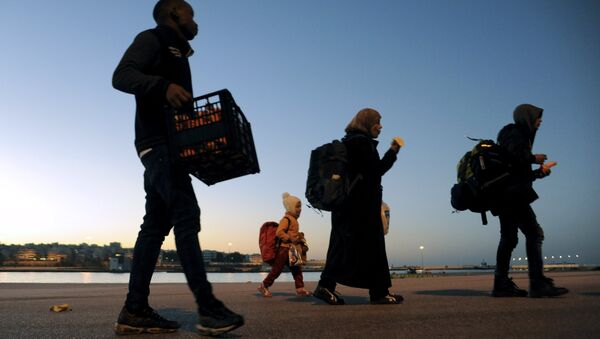Greek officials have started removing people from the country's border with Macedonia after Skopje made the decision to prevent Afghan migrants and refugees from entering the country and placed further restrictions on Syrians and Iraqis traveling from Greece.
Austria, Serbia, Croatia, Slovenia, Macedonia close borders 2 Afghans. 1000s of asylum seekers trapped in #Greece. pic.twitter.com/HNDmzxDxiK
— Bill Frelick (@BillFrelick) February 22, 2016
The caps, which officials say were triggered by similar developments in Austria and other Balkan states, have created a bottleneck in Greece, with reports on Monday suggesting that up to 10,000 refugees and migrants were effectively trapped in the country, with another 4,000 reportedly stuck in Athens' Piraeus port.
"We will either die here or go on." 5,000 refugees stuck at Greece-Macedonia border https://t.co/OsOkCQDIJb pic.twitter.com/RJqxiT55L6
— Patulani Samson (@patulanisamson) February 23, 2016
With fears of a huge backlog of people in Greece, officials in Athens have been making drastic diplomatic efforts to try and convince Macedonia to relax some of its border restrictions.
The development has led to fears in Athens that Greece's borders may be sealed off by its northern neighbors, effectively cutting the country off from the rest of Europe.
Meanwhile in #Greece, another 2800 #refugees have reached Athens since last night.#RefugeeCrisis #refugeesGr pic.twitter.com/4B9GpQX7nr
— Savvas Karmaniolas (@SavvasKarma) February 23, 2016
The decision implemented by many countries to enforce border caps and controls directly contradicts the position of the European Commission and other powerful nations such as Germany, further highlighting the split in Europe over the migration crisis.
'Lacking EU Culture'
During an interview with state broadcaster ERT television, Greek migration minister, Yiannis Mouzalas slammed the actions of its neighboring countries.
"Once again the European Union voted for something, it reached an agreement, but a number of countries lacking the culture of the European Union, including Austria, unfortunately violated this deal barely 10 hours after it had been reached."
Mouzalas accused countries along the Balkan route of "an outburst of scaremongering" while he also took aim at the hard line response to the migration crisis of the Visegrad group, consisting of Poland, Hungary, Slovakia and the Czech Republic.
"The Visegrad countries have not only not accepted even one refugee; they have not sent even a blanket for a refugee […] or a policeman to reinforce [EU border agency] Frontex."
In a further sign of the anger over the issue, Greek officials on Tuesday lodged a formal protest against Austria's decision to call a meeting of Balkan states to discuss the refugee crisis, without including Greece, saying it was a "unilateral and non-friendly act."
Police load with force a bus full of afghan #refugees in #Polykastro #eko station. #greece #refugeesgr #noborders pic.twitter.com/RsNiXzVXD0
— Cosimo Calabrese (@tempodiaframma) February 23, 2016
Greece has borne the brunt of the migration crisis, receiving hundreds of thousands of refugees during 2015 and the beginning of 2016.
With the country struggling on the back of an economic crisis, Athens has lamented the lack of assistance it has received from EU partners.
Despite European Commission plans to distribute 160,000 refugees from camps in Greece and Italy to other member states, so far only about 200 have been relocated.
However, Greece has attracted criticism for its handling of the crisis, with EU members states accusing Athens of failing to properly register and track all new arrivals into the country.



